-
ROMA (Alfonso Cuarón 2018)
ALFONSO CUARÓN: ROMA (2018)
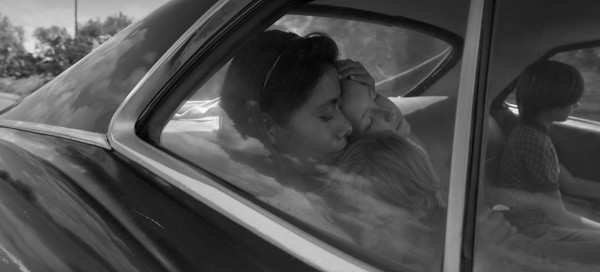
YALITZA APARICIO (LEFT) IN ROMA
Grandeur and helplessness in a portrait of Seventies Mexico City
ROMA won the top prize at Venice this year, the Golden Lion. This black-and-white film is an autobiographical memoir, intimate yet detached, of a bourgeois 1970's Mexico City family and their two maids, and some notable public events. Some are calling it a "masterpiece" yet Cannes didn't get it due to their feud with Netflix. This helps explain that it debuted and got the big prize at Venice; but Venice, not Cannes has always been home for Cuarón. It's Cuarón's first film since the 2001, also Venice-awarded, Y Tu Mamá También to be set in his native Mexico and maybe his best since that one. He wrote it, shot it, and edited it besides directing it. The result is brilliant and quietly shattering.
Roma's title refers to the posh middle class neighborhood of Mexico City where the film is set and Cuarón himself grew up. The sociological and archeological focus of the film is indicated by the fact that Cuarón built elaborate indoor sets of whole streets of Mexico City and whole avenues to recreate what the city and that neighborhood were like in 1970-71, the time of the story. The detail of these slow-pan portraits and the grandeur of the big sequences make it especially ironic that this film was sold to Netflix. Happily I was able to watch it on a very large screen, in Alice Tully Hall at Lincoln Center in the middle of the orchestra - a setting like the big old Mexico City movie palaces featured in the film itself where at one point the kids see an astronaut movie.
Cuarón himself proves a more restrained, less intimate cinematographer than his usual dp Emmanuel Lubezki, who likes to swirl around his subjects, a technique that came into its own five years ago in the director's last film, his own technically masterful astronaut movie, Gravity, whose seven Oscars let the filmmaker pick and choose his next project. Cuarón prefers medium shots, avoiding closeups at times when you might expect them, using slow lateral pans as serene transitions between scenes. The neutrality of the soft black and white also serves to distance us while nonetheless dazzling us with the clarity of its 65mm images.
Roma is more structured by big moments of unexpected drama than by a storyline. Big things happen, but there is no connected chain of events. This fits with a sense of helplessness brought about by placing women at the center. The two important men do their damage in absentia. The doctor husband goes on a fake trip to Canada and never comes home, removing his property and shelves full of books from the big messy house later unseen while the rest of the family is on an imposed "vacation" trip to the seaside at Tuxpan. The man of humble origin who gets the maid Cleo pregnant, Fermin (Jorge Antonio Guerrero), is an exhibitionist who explains to her that he has risen from the barrios by mastering martial arts. Later it appears he has joined a sinister right wing militia. He turns up three times and each time it is vivid and unnerving.
If one feels neutral and also helpless while watching, this most fittingly expresses the nature of the film's single most important character, Cleo (Yalitza Aparicio), the main family servant along with Adela (Nancy Garcia), both of whom are of indigenous and rural origin and talk to each other in a Mixtecan language. For the four children (whom one never gets to know) Cleo is family, their essential comfort, who puts the youngest (who does have some cute lines of dialogue) to bed at night exchanging heartfelt "I love you's." The movie is dedicated to Cuarón's own family maid, who is still around and who he said wept all through when she saw it.
Roma is rich in intimate scenes particularly between Cleo and the children. There is also the cruel intimacy and horror of the hospital where Cleo gives birth to a dead child, an event never so vividly and pitilessly seen on screen. Or the cute scene where the smallest boy lies back on the roof saying he's dead, and Cleo lies with him, her head touching his, saying she's dead too. There is the mundane or silly intimacy of Cleo sloshing water all over the tiles to clear away dog do in the opening credits, or of the household's wife and mother, Sra. Sofía (Marina de Tavira), and her terrible driving - though one can sympathize with her inability to steer the big Seventies American car into the too-narrow house carport.
But there are also the big grand scenes that fit with the grandeur of the production. The family visits a vast country house where hunting prevails and incredibly, the heads of generations of family dogs are mounted on the wall. A big fire outside is put out by campesinos. Student demonstrators riot in the street, then some take refuge in a furniture store and are pursued by right wing thugs with pistols shooting to kill. The mother and children go to Tuxpan where two of the children almost drown off the Playa and Cleo, though she can't swim, saves them. It's not Cleo and the children who dominate the screen in this climactic sequence but the huge roaring waves. In a hospital, there is an earthquake - though this sequence mixes the grand and the intimate, because it focuses on Cleo looking at the newborn babies. Typically for her, she stands mute, unable to do anything. There's a paradox about the maid's status. She is both indispensable and powerless. Cleo survives because Sra. Sofía stands by her. Sra. Sofía survives, and she and the children and servants and grandma Sra. Teresa (Verónica García) stay on in the house, because the social system and the economics of the time protect them, though Sra. Sofía has to go to work.
Any class system like this has inherent contradictions and so the film gives out mixed signals, in a way. It is both a critique of the world of male domination and inexorable class differences and nostalgic for aspects of life lived there. This mixture explains why Owen Gleiberman's Variety review describes Roma as "shimmering yet remote" and says Cuarón "puts us in close quarters with his characters" while "staring at them from a beatific and nearly abstract remove." This is my own impression. Roma is nostalgic and poetic at times but we don't get to know the characters all that well, and those qualities are brought to ground by the elaborate production, detached visual style, and documentary-like "neorealist" clarity. While greatly admiring the skill and sweep of this film I couldn't help feeling a more humanistic version of events would have emerged from much simpler means, the kind of means that sufficed for Y Tu Mamá También.
Roma, 135 mins., debuted at Venice and won the Leone d'Oro and SIGNIS Award, and showed in over a dozen other major international film festivals including Telluride, Toronto, Busan, Mill Valley, London, and the New York Film Festival, as part of which it was screened for this review (6 Oct. 2018). Curón having been called away, Benicio del Toro gave a rousing introduction to the film, declaring it to be not only Cuarón's best but number five of his own five favorite films. US release date: 14 Dec. 2018. Metascore: 95.
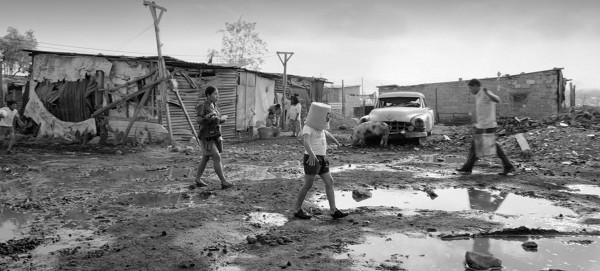
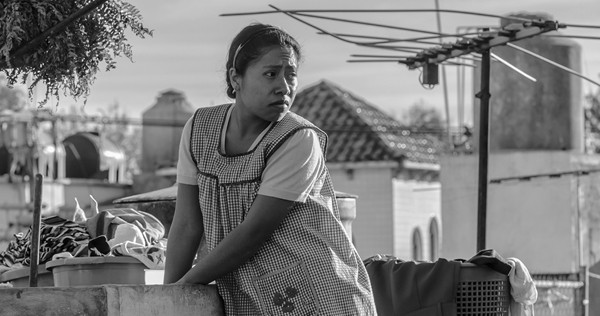
NANCY GARCIA IN ROMA
Last edited by Chris Knipp; 10-06-2018 at 07:04 PM.
-
A FAITHFUL MAN/UN HOMME FIDÈLE (Louis Garrel 2018)
LOUIS GARREL A FAITHFUL MAN/UN HOMME FIDÈLE (2018)
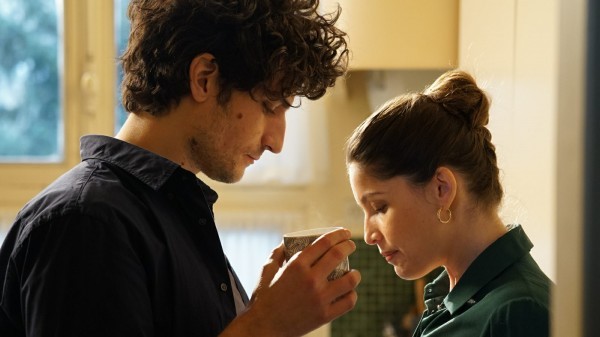
LOUIS GARREL AND LAETITIA CASTA IN L'HOMME FIDÈLE
Love and death: a quadrangle with a wise child
Louis Garrel's second film as director, co-scripted by the legendary Jean-Claude Carrière, is about a man (played by Garrel) whose girlfriend Marianne (Laetitia Casta) marries his best friend, then returns to him after her husband dies, but with the accompanying problems of a son who doesn't like him and troubling rumors about the husband's death.
In the opening, set earlier, Marianne gives Abel the bad news that his best friend Paul is the father of the child she's pregnant with, and she is choosing him over Abel. Abel walks out of her life not to return till nine years later.
Now Paul is dead, died in his sleep, it's said, and Marianne invites Abel - who's available - to come and see her. He meets her son, the nine-year-old Joseph (Joseph Engel). A pretty, self-assured boy he at once takes Abel aside and tells him "My mother killed my father." "How?" asks Abel. "Poison," says Joseph. This is a very choice scene, a little triumph that will stick in your mind.
Abel looks bemused, and we may laugh, but it's an arresting conversation that conjures up Highsmith filmed by Chabrol - or Hitchcock, whose murders often have humorous moments. You may say Joseph says this stuff to scare Abel away and have his mother to himself. But wait till you learn more about Joseph. The boy is an expert at solving mysteries and crime is his chief hobby. He's spent time with actual police and learned from them. Maybe he will grow up to be Chabrol, or Ozon. Or maybe this is just a joke. But not to Abel, who when Marianne serves him a hot tizane, eyes it nervously and only takes a sip.
The conversation between Joseph and Abel goes further. Marianne's own doctor, we learn, filled out the death certificate for Joseph's father without ordering an autopsy. Why was that? Abel asks Joseph. "My mother slept with him," he replies. He, Joseph, can't remember the doctor's name but it's the name of a flower, beginning with P. It takes Abel a while to think of the right flower, peony. And he goes and talks to Doctor Pivoine, who tells him that he is gay. Pivoine is not gay, Marianne says, and Abel sees Pivoine with a girlfriend. Another droll and provocative sequence.
Did Marianne sleep with Pivoine? We never find out. But it's evident Joseph doesn't like Abel. No secret about that. He says so. Nonetheless Marianne takes Abel in to live with her, so Abel "steals" Joseph's mother, as he puts it to Abel later.
The film pitches us a new curve ball: Paul's younger sister, Eve (Lily-Rose Depp), who enters the picture to tell her story in voiceover. She talks of nothing but her love for Abel, who she says she's been mad about since she was a girl, carrying photos of him everywhere and thinking of him constantly. Now neither a girl, nor an adolescent, nor a virgin, she presents herself to Abel and declares her lust for him. She asks, and he admits, "physically" he indeed finds her very pretty.
Marianne herself suggests that perhaps Abel should try Eve, sleep with her a few times, just to see whom he prefers. This turns out to mean taking his things to Eve's little student apartment-room: Abel can't be coming back to Marianne's place every night during the process. It goes on for a while.
Till Joseph steps in again. He had reassured Eve earlier of her good prospects with Abel by telling her his mother and Abel were not having sex that much. He could prove it. He made recordings of them under the bed with his iPhone.
But then he turns Eve off to Abel with one of his little jaw-dropping pronouncements: "My mother told Abel to come to you," he says - which is true, of course. When Abel returns to Eve's flat he finds his things packed up and stacked outside the door.Things were not going that well anyway, for Eve. Whenever she had sex in the past, she always fantasized Abel. But when she has sex with Abel, who can she fantasize? She thinks the sex was better when it was inspired by Abel than is has been with Abel.
A discussion between Abel and Marianne reveals that she was sleeping with him and her late husband at the same time, and she doesn't know who the father of Joseph really is. Moreover, she really loved Abel more, but she wasn't able to choose between the two men and to do so, flipped a coin, and Abel lost. She regretted that, but the die was cast.
This a film as classically, quintessentially French as you could ever want, and Louis Garrel, who became a star with other directors, notably as the muse of Christophe Honoré, is steeped in French cinematic tradition with an actor grandfather and director father. Yet as Garrel has said, he does "terrible things" in this film. Isn't it taboo to mimic the French New Wave? Yet here in L'homme fidèle he has voiceovers, apartments, two women and a man, coffee - all the Nouvelle Vague stuff Godard, Truffaut, et al. are known for.
But he has this excellent cast, including himself, and this precocious boy of nine. Garrel himself is handsome in a very special way, is photographed as flatteringly as ever in his own films, and brings sexiness and wit and a light touch to his performance here that centers the film. Laetitia Casta, his real-life wife, is a memorable beauty with shimmering pale blue eyes. (In the Gainsbourg biopic she played Brigitte Bardot.) Lily-Rose Depp is the daughter of a famous French beauty and Johnny Depp. Here she is as fresh as a flower blooming in the rain.
The star of the show is Joseph Engel, though. Joseph is the pivot-point and premise of the film. It is his provocations that start the reverberations. Moreover, he isn't just a preternaturally wise, Shakespearean-style child - though at one point Abel declares that he doesn't know how to talk to children. Talking to them like adults isn't right. But when he talks to them like a kid that doesn't work either. In other words, he is no ordinary child. But he is a piece carved out of Louis Garrel's own past. Laugh if you want, it wasn't so funny for little Louis at the time.
At the New York Film Festival Lily-Rose Depp, Laetitia Casta, and Louis Garrel were all present for the Q&A, and Garrel talked a blue streak. His English was a bit halting years ago but now he is fully able to "se débrouiller," as the French say, he can "get by" very well, while a certain remaining roughness seems to free him to say franker or funnier things than might come out in French. At Lincoln Center, he was full of ideas and funny, and revealing, especially talking about himself as a child of divorced parents acting in one of his father's films when he was six, where his mother was in a scene sleeping with another man, and his father with another woman, and he wasn't dead certain what was fake and what was true.
About Joseph, Garrel said you need to remember that at nine a boy already "knows everything." He also admitted that he himself recorded his mother under her bed - like the boy in the film, to see if she was having sex.
L'Homme fidel is in some ways simpler, fresher, and more playful than a Nouvelle Vague film. It's also more precisely constructed and carefully paced than Garrel's directorial debut Two Friends, which had more frenetic activity and more improvisation. This is a puzzler that alludes to Marivaux, and also delves into Freudian aspects of childhood, while delighting in leaving questions unanswered. Its final scene, a silent one, has that aspect of classic comedy in that the three adults are all united, holding hands behind Joseph. He had disappeared, and is found again. This is a fluent, splendidly economical, elegant and delightful film that fulfills all the promise of Garrel's directorial debut and goes beyond it. Next perhaps as Jordan Mintzer says in his Variety review penned at Toronto, he should break free a little further from tradition and introduce more elements purely his own.
A Faithful Man/L'homme fidel, 75 mins., debuted at Toronto 9 Sept. 2018, also showing at San Sebastién, Zurich, and the New York Film Fesival, where it was screened for this review 7 Oct. 2018. It comes to French cinemas the day after Christmas.
Last edited by Chris Knipp; 04-08-2019 at 10:34 PM.
-
SHOPLIFTERSs/万引き家族 MANBIKI KAZOKU (Hirakasu Koreeda 2018)
HIRAKAZU KOREEDA: SHOPLIFTERS/万引き家族 (2018)
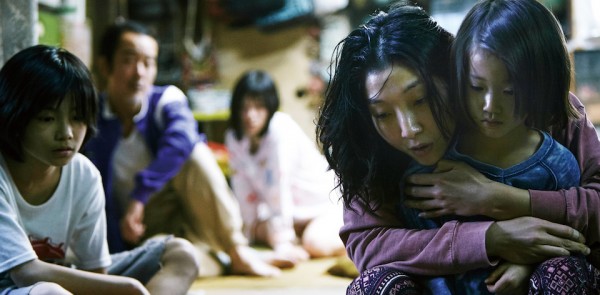
KAIRI JYO, LILY FRANKY (BLURRED), MAYU MATSUOKA, ANDMIYU SASAKI IN SHOPLIFTERS
Humanity under duress; unity in disorder
Koreeda's remarkable new film, one of his best, resembles his previous masterpiece, Nobody Knows, or Kurosawa's Dodaskaden, and may also remind you of Dickens' Oliver Twist with its school for pickpockets. But it's different from them in its focus on the ambiguous relationships of an ersatz "family" living outside the law and well below the poverty line. It clarifies some things at the end but leaves questions unanswered, its shifting, incremental story having taken up fixed residence in our heads. It teaches us things about poverty and morality under stress that most of us didn't know, or want to consider.
The "family" unit, who live somewhre in Tokyo, starts with Osamu (Lily Franky), a day laborer. His wife is Nobuyo (Sakura Ando). She works in a big laundry run like a factory. Her half-sister Aki (Mayu Matsuoka) strips for unseen clients in a sex shop. An old lady, Hatsue (Kirin Kiki), is drawing her late husband's pension illegally, contributing it to the collective "family" and also collecting money periodically from relatives. A bright little boy they call Shota (Kairi Jyo) has learned to shoplift in coordination with Osamu, who may prefer larceny to work, not that he has good prospects. They all live together in a little ramshackle hutch.
In an early scene Osamu and Shota are stealing food from a market, and on their way home they come across Yuri (Miyu Sasaki), a little abused girl left out in the cold. They take her in, and instead of reporting her to the police, as they should, they decide to adopt her. They feed her - eating being the group's most pleasurable shared activity - and they mend her wounds and later, Osamu and Shota teach her to shoplift.
But that description doesn't feel quite true to the movie's texture, because It constantly shifts around, weaving in other observations, remaining unexpected. What emerges is that everybody in the "family" pretty much has everyone else's back. And though Yuri is shy with everyone and about everyone (still preferring to remain, not go home), and Shota resists callng Osamu "Dad" or Nobuyu "Mom" as Osamu wants, simple family warmth pervades the little house.
Things change when the old lady dies and Shota gets caught stealing, bringing police and social workers in. Shifting gears then, the film provides snatches of interviews with each person. During the runtime of the film, "family" has gotten closer and closer, becoming like a real family, maybe better, because united by a simple life without cell phones or computers. But now things come apart. Masks fall away. It emerges that the adults were keeping up a front and concealing secrets, some of which were ugly. The "family" act enabled the adults to show perhaps a better side of themselves. But it was a sketch rather than a finished painting - set to self-destruct, like Banksy's little girl with the red balloon.
And thus Shoplifters becomes self-reflexive, a story about telling stories, a lesson in what powerful emotions a tinsel tale can evoke. Koreeda uses his background as a documentary filmmaker here, but he adds questions and statements that deepen his tale, retaining an offhand, observational surface.
Shoplifters won the Palme d'Or of the 2018 Cannes Film Festival, the first Japanese winner of the top prize since Shohei Imamura’s The Eel in 1997.
Shoplifters / 万引き家族 (Manbiki Kazoku, "Shoplifting family"), 121 mins., debuted in Competition at Cannes, and was shown in 27 other international international festivals, including the New York Film Festival, as part of which it was screened for this review. It was selected as the Japanese entry for the Best Foreign Language Film at the 91st Academy Awards. It opens in New York and Los Angeles 23 Nov. 2018. Metascore 93.
See Max Shilling's review and article on the film for Japan Times.
Last edited by Chris Knipp; 10-16-2018 at 01:23 PM.
-
COLD WAR/ZIMNA WOJNA (Paweł Pawlikowski 2018)
PAWEL PAWLIKOWSKI: COLD WAR/ZIMNA WOJNA (2018)
Love and war
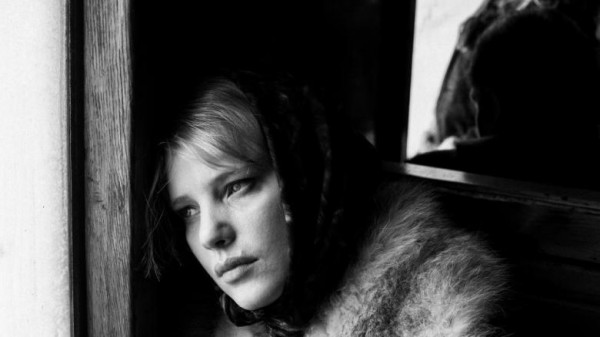
JOANNA KULIG IN COLD WAR
From the acclaimed director of the very fine 2013 Ida and similarly focused on Iron Curtain love and shot in crisp, beautiful black and white, a story people are finding even bleaker than its predecessor. A passionate love story between two people of different backgrounds and temperaments, who are fatefully mismatched, set against the background of the Cold War in the 1950s in Poland, Berlin, Yugoslavia and Paris. In Competition at Cannes, it won the Best Director award there and was a Palme d'Or nominee.
A visual dazzler that is also so packed with music you could call it a musical. It's in academy ratio, and a marvelous economy that impresses in this ear of overblown movies that go soft. The man, Viktor (Tomasz Kot) is a conductor, the girl, Zula (Joanna Kulig) is a promising young singer he takes a liking to at her first interview. This is also a portrait of Polish Iron Curtain folk music propaganda. The group we follow around is powerful nativist propaganda. The artistic leaders resist the bureaucrats' request that they introduce political, pro-Stalin songs into the touring show. They lose.
Pawlikowski works in bold units jumping forward in time, like dealing out cards from a deck. Some of the earliest shots are so beautiful and rich in tonalities they're like stills. And the final shot is one of the most beautiful of all, and the darkest and saddest. Along the way, the precise recreation of period and costumes would seem mannerist if the scenes were not so deft and powerful. Many shots of groups of men look like photos of Soviet-era crowds down to the last button. But the music is nearly as powerful an impression as the image, if not more so.
There are various types of real and pseudo slavic film music and cold war propaganda ditties, and there is jazz, and French chansons, rock and roll, and the final credits roll over Bach's GoldBerg Variations. The lustiness and power of a cappella singing in the early sequences is overwhelming. It grabs you by the throat. It's hypnotic. And a little comical.
The action hinges on defection. Viktor and Zula are having a mad affair, and the group they're in is so successful it's getting plum tour assignments. When they're in Berlin he proposes that they go over to the western side, and he argues her into agreeing. But when the evening comes, he waits for hours with suitcase and cigarette and she does not come.
And so the mad affair ends. Only it doesn't. But there is a gradual understanding that they can never be happy, either in their lives, or with each other. He goes to Paris, and becomes involved with a French woman poet, Juliette, played by Jeanne Balibar (I half expected her to be the singer Barbara, whom she played so well in Mathieu Amalric's recent film). Zula eventually comes to Paris. She has her own man now. But it's understood that she and Vikor must reunite, and they do. But Zula finds fault with Juliette's poetry, which Viktor wants to use in an album Zula will make in Paris. (She sings it anyway.) She thows away the album as "trash."
Zula thinks Viktor in Paris is no longer a man. They live in a large loft with a big mansard roof, classic. One of the almost nonstop arresting sequences - they are arguably so numerous they overwhelm the film and make it more like a pageant - is at a club where Bill Haley and the Comets' "Rock around the Clock" plays at top volume and Zula dances with multiple partners, while Viktor sits impassively by. Yet another style of music, coming right after pseudo Mexican, and another arresting scene of virtuoso intensity.
Viktor cares so much for her he is willing to go back to Poland, where he is found guilty of multiple crimes and goes to jail sentenced to fifteen years. But strings are pulled and he gets out. Then, they go to Greece, and to the other side. What will Pawilikowski do next? One wonders.
Tomasz Kot might be ordinary looking except that he's so tall. He never droops, despite Zula's occasional disapproval. Joanna Kulig is the star, a variable woman who can look beat up and exhausted one moment and dazzling and beautiful the next. One expects surprises from her after her first appearance. She projects triumph and insecurity in equal measure, a troubling presence. With her one enters a world of the dangerous and unpredictable. A world of the Cold War era Pawlikowski has made his own, at least for now. Pawlikowski certainly knows how to make movies. At the NYFF Q&A with Kulig, speaking perfect English, he seemed almost matter of fact.
Cold War, 88 mins., debuted as mentioned at Cannes and won the Best Director award. AT least 30 other festivals are listed on IMDb, including Toronto and the New York Film Festival, screened at the latter for this review. The US theatrical release is scheduled for 21 Dec. 2018. Metascore 90.
Last edited by Chris Knipp; 10-09-2018 at 08:35 PM.
-
ASH IS PUREST WHITE/江湖儿女 (Jia Zhang-ke 2018)
JIA ZHANG-KE: ASH IS PUREST WHITE / 江湖儿女 (Jiang hu er nv) (2018)
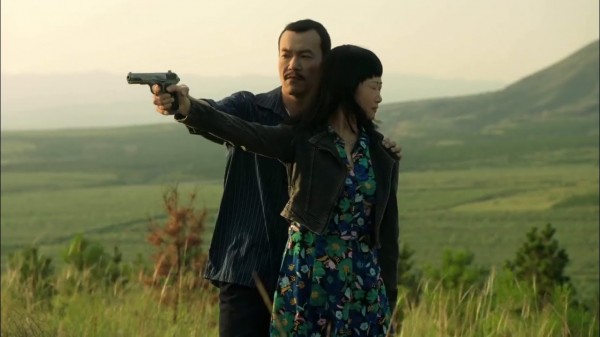
LIAO FAN AND ZHAO TAO IN ASH IS PUREST WHITE
Gangster love in modern China
A "gangster epic," some call this film. But more than that it's a love story, heavy on the disillusionment and survival and light on the romance. Epic in feel it nonetheless is, with its panoramic vision of survival and transformation in 21st-century China. It starts in 2001 and ends somewhere near today, where people are compulsively filming each other with their smart phones. Riveting, strangely reminiscent at times of Wong Kar-wai and clearly referencing some of Jia's earlier films, especially Unknown Pleasures and Still Life (and his first foray back into gangster territory since A Touch of Sin). There are also homages to John Woo. This is a reconsideration of the romantic heroine of those two films and its two parts are set in their respective settings, the towns of Datong and Fengjie. Organic and intense yet calm, Ash shows a master filmmaker at the top of his powers.
At the center and nearly always on screen is Jia's muse and wife Zhao Tao as Zhao Qiao, owner of a little bar (with Mahjong) where she falls for a local gangster with an air of authority, Bin (Liao Fan, of Diao Linan's neo-noir Black Coal, Thin Ice). We don't see him doing much gangstering, but there is violence, off-screen and on. Bin talks recurrently about being Jianghu, and for the non-sinologist that seems to mean, maybe, trouble with moral values (see Maggie Lee's more informed Variety review for specifics). It sometimes may mean panache, sprezzatura; other times, duty and resignation. Anyway Bin is a provincial Datong gangster, a big fish in a small pond whose many "brothers" clearly show him much respect at the little mahjong club.
In the first scene Bin takes out a pistol, and Qiao handles it. We hear of a businessman, probably shady, but without known enemies, being murdered after a sauna by young toughs. Violence on screen is sudden: quickly two similar aspiring young tough guys attack Bin with a metal pipe and badly damage a leg. He lets thems off easy when they're identified and brought to him. (Turns out they hit the wrong man. Beginners' bad luck.) Later, Bin, looking posh, is riding with Qiao in a chauffeured car and the violence ramps up. He jumps out of his car to counter-attack a crowd of thugs in a brutal and physically specific street battle where at first he is winning, then very much not, and she steps out and saves his life with that pistol. They both go to jail. He gets out years sooner, but Qiao is released he isn't at the prison gate to meet her. She begins an odyssey in search of him.
This man and woman are more completely at the center than the figures in Jia's 2007 Still Life but this new film refers to the same great upheavals, particularly the decline of a mine industry and the displacement of 1.4 million people for the Three Gorges dam. There are several train trips that provide a sense of the dizzying shifts in population, industry, business that are the China of this period. In Jia as maybe with any great filmmaker genres don't mean anything. If this is a muted gangster tale as well as a disillusioned romance it's also a haunting vision of socioeconomic upheaval. Disco seems to have come late to China: there's an intense, rousing sequence of a massive crowd dancing to the Village People's "YMCA." There is a strong thread of humor and one is the snappy dance duo who appear here later turning up with sublime absurdity to perform at a gangster elder's funeral.
All that is prelude, though essential. The part that counts is Qiao's trip to Fengjie where she's heard Bin is, and she has his number in her cell but he's not answering. Like a picaresque hero she loses everything on a boat ride but uses clever scams and deceptions - why didn't we know she had them in her? - to restore funds and force Bin, who is dodging her, to explain himself. In this most compelling and personal section Qiao, as Maggie Lee puts it, "takes charge of her life with the desperation and resourcefulness that make her an icon of the Chinese can-do spirit." .Later both she and Bin are transformed and there are more train rides, one with a mesmerizing charlatan touting his travel or tour agency, he hasn't decided what but he's seen aliens. Qiao hooks up with him for a little while. Then she and Bin are together, for longer. But nothing lasts. The sense of personal emotional saga and richness of texture could not be better.
Important in the success of this masterful film is the sometimes fatalistic score, and the European team of dp Eric Gautier, who make the transitions from DV (in Academy ratio) to Digibeta, HD video, film and Redweapon cameras seamless and suggestive.
Ash Is Purest White /江湖儿女; Pinyin: jiānghú érnǚ ("Sons and daughters of Jianghu"), 137 mins., debuted in Competition at Cannes including Munich, Jerusalem, Toronto, New York, Vancouver, Busan, Mill Valley, London, recut for Toronto. It was screened for this review at the New York Film Festival, 10 Oct. 2018. MK2 is the producer.
Last edited by Chris Knipp; 10-11-2018 at 10:39 AM.
-
ASAKO I & II /寝ても覚めても (Ryūsuke Hamaguchi 2018)
RYUSUKE HAMAGUCHI: ASAKO I & II/寝ても覚めても NETEMO SANTEMO ("At all hours") (2018)

ERIKA KARATA AND MASAHIRO HIGASHIDE IN ASAKO I & II
Wavering
The director had made seven features and documentaries since 2007 when his five-hour Happy Hour (ND/DF 2016) three years ago gained him international attention, and that helped him jump right into Competition at Cannes with his new film, Asako I & II. Adapted from a novel of the same title by Tomoka Shibasaki, it's about about a young woman torn between two identical-looking young men, one rakish and wild, the other reliable and conventional. The contrast is itself a very conventional one. A similar theme was treated (in a sexier, more provocative way) last year by François Ozon in Double Lover. Ozon was playing to a grownup taste in thrillers and S&M. Depending on how you look at it, Hamaguchi's take is delicate and mysterious, or bland YA rom-com stuff.
There is fun in observing the game either way, Ozon's way or Hamaguchi's way, of a woman being pleased or tormented by an attractive man. In Ozon's case it's the elegant former model Marine Vacth and the seasoned Belgian actor Jérémie Renier, who got his start with the Dardenne brothers. In Hamaguchi's, it's the tall, thin, delicately handsome Masahiro Higashide, who plays both the sexy, undependable Baku of Osaka and the conventional, reliable, less exciting Ryohei.
It's fun to admire Higashide's looks in both roles, and the two performances are in more subtle shades of difference than those imposed on Jérémie Renier by Ozon. Not that Higashide doesn't look quite unlike Baku when he turns up as Ryohei. Baku has a wild mop of hair and bohemian attire of jeans and flip flops; also, according to Maggie Lee's Variety review, as Baku he speaks in a broad Osaka dialect (they meet there; she meets Ryohei in Tokoyo). Ryohei is a young salaryman (he works for a brewery) in standard suit and tie uniform. The different look makes all the difference. The actor does a good job with it.
The trouble is that Asako, as played by Erika Karata, is the same passive, doll-like young thing with both men, and her indecision, which Lee calls "banal," just seems silliness, or very poor judgment. If only she were in the grip of something complex and compelling; but she doesn't seem to be. A less recognized unwisdom, we might say, is that of Ryohei, who gathers early on that Asako's attracted to him because of his resemblance to another guy, but goes on despite this to fall in love with her. We may want to forgive him because he's basically a a decent and reliable chap. But Asako isn't the only foolish one.
We don't really see much of Baku - he isn't around for that long - and some audience members, seduced by his attractiveness, may find him dreamy, as Asako does, but he can easily be seen as a narcissistic doofus - which his later reappearance turned into a supermodel does nothing to dispel. Asako's friends warn her right off that he's an unreliable seducer. The trouble is telegraphed to us right away when he goes out for bread and doesn't come back till the next day.
Nonetheless they fall in lust, with heavy kissing, even after they've crashed a motorcycle and are lying sprawled on the highway. Months later, the affair ends when he goes out to buy shoes (to replace those flip flops, no doubt) and disappears. She's so devastated she moves from Osaka to Tokyo. With Ryohei, it really lasts, Asako sets up domestic life in an apartment overlooking a river, and they're together that way for five years. But her "thing" for Baku never goes away, it turns out.
As in Happy Hour, what's interesting is the ensemble scenes, when Asako is with friends, or friends of friends. There's a notable exchange - also maybe a sign of Hamagushi's tendency to go off on a tangent - when Ryohei brings Kushihashi (Kôji Seto), a work associate, to Asako's to meet her best friend Maya (Rio Yamashita), who is an actress. Kushihashi (turning out to be a frustrated actor himself) launches into a vehement, pointedly rude attack on her acting style, which he then abjectly apologizes for. Hamaguchi interpolates a sequence of the massive 2011 Japan earthquake (not in the novel; but he made a 2012 documentary about it, The Sound of Waves). These surprises add interest, as do the secondary characters.
But the film keeps coming back to the conventional contrast between the two men and Asako's immature behavior. Stephen Dalton in his Hollywood Reporter review calls her an "annoying airhead" who "would not pass even a basic Bechdel Test." That is to say, all she ever talks to other women about is men. Anyway - and this criticism applies to Ozon's Double Lover - the whole story hinges on a fantastic conceit and the focus becomes the conceit - or how Masahiro Hirashige plays the two contrasting roles - rather than on human relations. The kind of keen, specific observation we got in Happy Hour is too often missing here. Let's hope Hamaguchi will go on to better justify his new international recognition.
Asako I & II/寝ても覚めても NETEMO SANTEMO ("waking or sleeping"), 119 mins., debuted in competition at Cannes; eight other international festivals including Taipei, Toronto, Vancouver, and the New York Film Festival, where it was screened for this review 7 Oct. 2018. Metascore 62.
Last edited by Chris Knipp; 04-08-2019 at 08:33 PM.
-
TRANSIT (CHristian Petzold 2018)
CHRISTIAN PETZOLD: TRANSIT (2018)
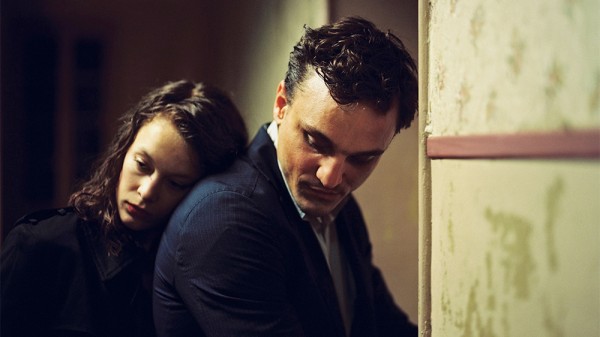
PAULA BEER AND FRANZ ROGOWSKI IN TRANSIT
Loneliness, fear, loss, alienation, suicide, fluid identity in a war story out of time
When a man flees France after the Nazi invasion, he assumes the identity of a dead author whose papers he possesses. Stuck in Marseilles, he meets a young woman desperate to find her missing husband - the very man he eventually turns out to be impersonating. Christian Petzold casts Franz Rogowski and Paula Beer in his adaptation of Anna Seghers' novel Transit Visa, set in the 1942 Marseilles zone libre (free zone). What he does with the source is strange and intriguing, and creates a memorably haunting mood if you give yourself to its peculiar mysteries. My faithfulness to Petzold remains, even when he's working without his muse, Nina Hoss (he finds a good equivalent in Paula Beer). This is a distinctive, difficult, but potentially very rewarding film.
"There are those who treat melodrama as a dirty word" wrote Guy Lodge in Variety, "but no working filmmaker gives it a cleaner, crisper reputation than German auteur Christian Petzold, whose extraordinary anti-historical experiment Transit nonetheless registers as his most conceptually daring film to date." "Anti-historical experiment" because Petzold tells Seghers' Forties story with a contemporary background (but without ultra-current details like smart phones).
Petzold has drained the specifics of the World War II and Holocaust-related content from the material of the source novel, which is of its period and none other. The replacement semi-contemporary recreation allows connections between refugee horrors of World War II and the new ones of today, which for the first time are just as bad, with a new global pointlessness and complexity. I refer the reader to a Wikipedia plot summary (which is rather general) for the outlines.
Georg (Rogowski), "Germany’s Joaquin Phoenix," has the remnants of a split lip, a slight lisp, a taut intensity. We don't know quite what he's fleeing, while Seghers' protagonist was a concentration camp escapee. . But the WWII fugitives in Marseille, whose time was running out, as here, he seeks permission to sail to another country that will be haven. For a while he bonds with a little boy, an aspiring soccer star whose penchant he encourages. This activity best fits with the incongruously cheery, sunny Marseille exteriors. The boy has only a mute mother with whom he communicates in sign language and wants Georg to stay around; feels betrayed when Georg says he must leave. Georg later returns to their flat and they are gone; it's packed with exotic refugees.
This is a diversion, anyway. The main storyline focuses on the American consulate and the people Georg encounters there, including a woman with a pair of fancy dogs she'll be rewarded with safe harbor for bringing to South America. (That ends badly.) And there is Georg's uneasily intimate connection with the fate of a writer he's supposed to help out, Weidel. He's shown a bloody bathroom, and learns Weidel is dead by his own hand. Papers that fall into his hands, meant to go to Weidel's wife Marie (Paula Beer), eventually enable Georg to take on Weidel's identity and permission to travel. But as he comes to be in touch with Marie, he's also enmeshed with a doctor named Richard (Godehard Giese). . .
Everyone's fate and plans are in flux, and as Georg falls in love with Marie, he becomes more eager to sacrifice his own future to satisfy her dreams, deluded though they may be. Petzold takes us into a world of extraordinary pressures and fluid identities.
The fact that the film is ahistorical will alienate viewers, but also enables Petzold to create something both hauntingly Kafkaesque ("a remake of 'Casablanca' as written by Franz Kafka" David Ehrlich of Indiewire called it) - as well as a film close to the melancholy, ruminative WWII material of French 2014 Literature Nobel Patrick Modiano. It takes a while to figure out what's going on in Transit - and one of the story's characteristics is that the people don't know what their plans are, either. This is a film some will hate, and others love. If it's the latter outcome for you, this style-drenched, plot-neutral film may reward repeated viewings.
Transit, 104 mins., debuted at Berlin Feb. 2018, showing in about a dozen other international festivals, including New York, where it was screened for this review as part of the Main Slate 14 Oct. Metascore 72.
Last edited by Chris Knipp; 04-03-2019 at 05:27 AM.
 Posting Permissions
Posting Permissions
- You may not post new threads
- You may not post replies
- You may not post attachments
- You may not edit your posts
-
Forum Rules







 Reply With Quote
Reply With Quote






Bookmarks